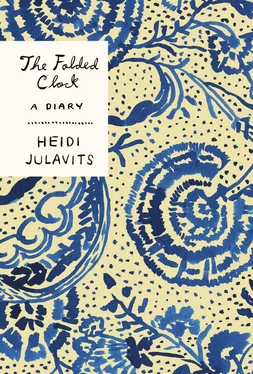I wanted to ask one of my real-life doppelgangers what she thought about how we looked. Apparently there are many I could ask. I am always meeting people who say, “You look exactly like my cousin!” This has happened frequently enough that I’ve decided I am a generic type. I am everywhere. This explains why strangers are always asking me for directions. During the school year, when I live in New York, I am asked for directions almost every day. I’ve witnessed so many lost people in New York scan the pedestrian horizon and settle on me. They looked relieved. There. There is a familiar face . I’ve been lost in cities where I don’t live, and even then I’m asked for directions. I say, “I don’t live here. I’m lost too!” These pedestrians think I’m lying. They turn from me, disappointed. How small and ungenerous I am, pretending I’m a tourist in my own city, pretending not to speak German or Croatian, just to avoid helping them out.
The other possibility: I am trusted by strangers because I am a teacher. I was informed by the psychic I saw for research purposes, You are a teacher . (She also told me that my three-year-old son would grow up to run a bed-and-breakfast.) In fact I am a teacher, but I think she meant it metaphorically. I am a person who guides other people. I share and impart knowledge. I can tell people where the nearest subway is located. I did not take the psychic seriously until I was stricken by a weird illness this past spring. When my friend advised me to see my affliction as an opportunity to become a new person, I decided that I’d give up writing fiction and become a different kind of teacher. A life teacher. I’d give directions to the nearest life subway. I’d say things like, “There is nowhere to be, only everywhere to go.” I’d become a guru. I honestly had a moment when I thought, This is why I got sick, because the world needs me .
Then I got better.
Once I met one of my doppelgangers. She was not some abstracted cousin; she was the good friend of one of my good friends. We spent a weekend together celebrating our mutual friend’s wedding engagement. Looking at her was like looking in the mirror when I was a kid— Is that really me? She thought I was her. She said, “It’s so weird! We really do look so much alike!” I wasn’t seeing it beyond the hair and eye color. It’s true that we emitted a similar vibe; at the onset, we presented as energy twins. But she is never self-deprecating (I am always self-deprecating), and always confident (I am confident, but not outwardly). As the weekend progressed, we looked less and less alike to me, then not alike at all. Which didn’t mean I didn’t like her. I really liked her. I politely agreed with her pronouncements that we resembled one another. I know, it’s so weird! It seemed impossible to deny our similarity without inadvertently insulting her ( You? God no, I look nothing like you ) or sounding bizarrely defensive, like a woman who has only recently come to resemble herself.
Today, or rather tonight, my husband and I will be watching “The Men Tell All.” This is the penultimate show of The Bachelorette , Season Eight. On “The Men Tell All,” the men whom the bachelorette, Emily Maynard, has rejected over the course of the season are interviewed by Chris, the host of what my husband and I call “The Franchise.” The Franchise comprises three shows: The Bachelor, The Bachelorette , and Bachelor Pad . It is my husband’s contention that everyone on the planet will eventually be part of The Franchise. We dream of this happening.
On “The Men Tell All,” the guys don’t dish on Emily; they dish on the other guys. They dish about inter-guy relations. The guys live in a house called “the house,” and “the house” remains the name for their communal living situation, even if “the house” is a hotel suite in Dubrovnik. In the house there are assholes, there are sweetly misunderstood wallflowers, there are asshole wallflowers, and, on “The Men Tell All,” everyone accuses everyone of being exactly what they are, and a studio audience boos when jerky guys refuse the mantel of jerkhood, and applaud when the jerks are called out by the narcs, who would probably be jerks themselves if the bigger jerks hadn’t been around to fill the role.
I am asked by apparently more sensible people why I watch this show. It’s so fake, the sensible people say; it’s totally rigged. The contestants are actors. They just want to become famous. To enjoy the show, to these people, is to fail to remember this, and to be swept up by a fiction you think is not one.
But I believe there are a few more floors to the house of fiction/reality than these people, and maybe even the contestants, realize. I honestly believe that people fall in love on these shows. I do. Here is why: Crushes thrive in small spaces. Humans must be programmed to respond positively when faced with a small sampling of other humans in, say, caves. You’re stuck in a cave with three other people — all mankind, presumably, was hidden away in such tiny groups during the winters until the thaw — and so, in order for the species to thrive, you must biologically be compelled to fuck at least one person in your cave, despite the fact that, when surrounded by a plenitude of Neanderthals at the Neanderthal summer barbecue, none of them struck your fancy. Without the element of choice, and in conjunction with captivity, you find love, or at least you find lust.
This has happened to me many times. It happened to me on a canoe trip; the minute we returned to civilization, I recanted my crush on the guy I’d angled to sit next to at the nightly campfires. I have been so cognizant of this phenomenon, and its inevitability, that I got nervous in college while waiting to hear where in France I was to spend my semester abroad, because I knew that a guy my friend was dating, someone I’d always found abstractly cute, was also going to France. Fortunately we were sent to different cities. Had we been in the same city, I am certain we would have fallen in love, or the sort of love that occurs in those situations, call it what you will, probably a mistake. This is also why I get nervous about going to art colonies, especially now that I am happily married to a man I met at an art colony. I don’t want to fall for anyone else — I am pointedly not looking to fall for anyone — but these situations conspire against our best intentions. Art colonies, often located in remote woods or on beautiful estates, are communities in which all the residents sever ties to the real world within hours of arrival; they are like singles mixers for the married or otherwise spoken for. (I was married when I met my now-husband, who was otherwise spoken for.) When I arrive at a colony these days, I take a measure of the room, I identify the potential problems, I reinforce my weak spots, and then I relax.
Even the larger world can conspire to trick its inhabitants with caves of a sort. A few summers ago I developed a crush on a guy working on the barn outside my studio in Maine. For many hours a day we worked in the same approximate space. I’ve known him for years; he and his partner are good friends of ours. My point is that this crush had no basis in reality or in my imagination; it had so little basis in either realm that I couldn’t even fantasize about a next move. He was just a fun reason to go to work each day, and he reminded me how, during the eighteen months that I had a real job, i.e., an office job and not a waitressing or teaching job, I had to develop a crush in order to want to go to work. My office crush was a very capable and married Norwegian. He once joined a rescue mission in the Sierra Nevada Mountains to find our lost coworker. He later told me he’d spent two grim days stabbing his ski poles into snowdrifts, looking for a body.
Читать дальше












